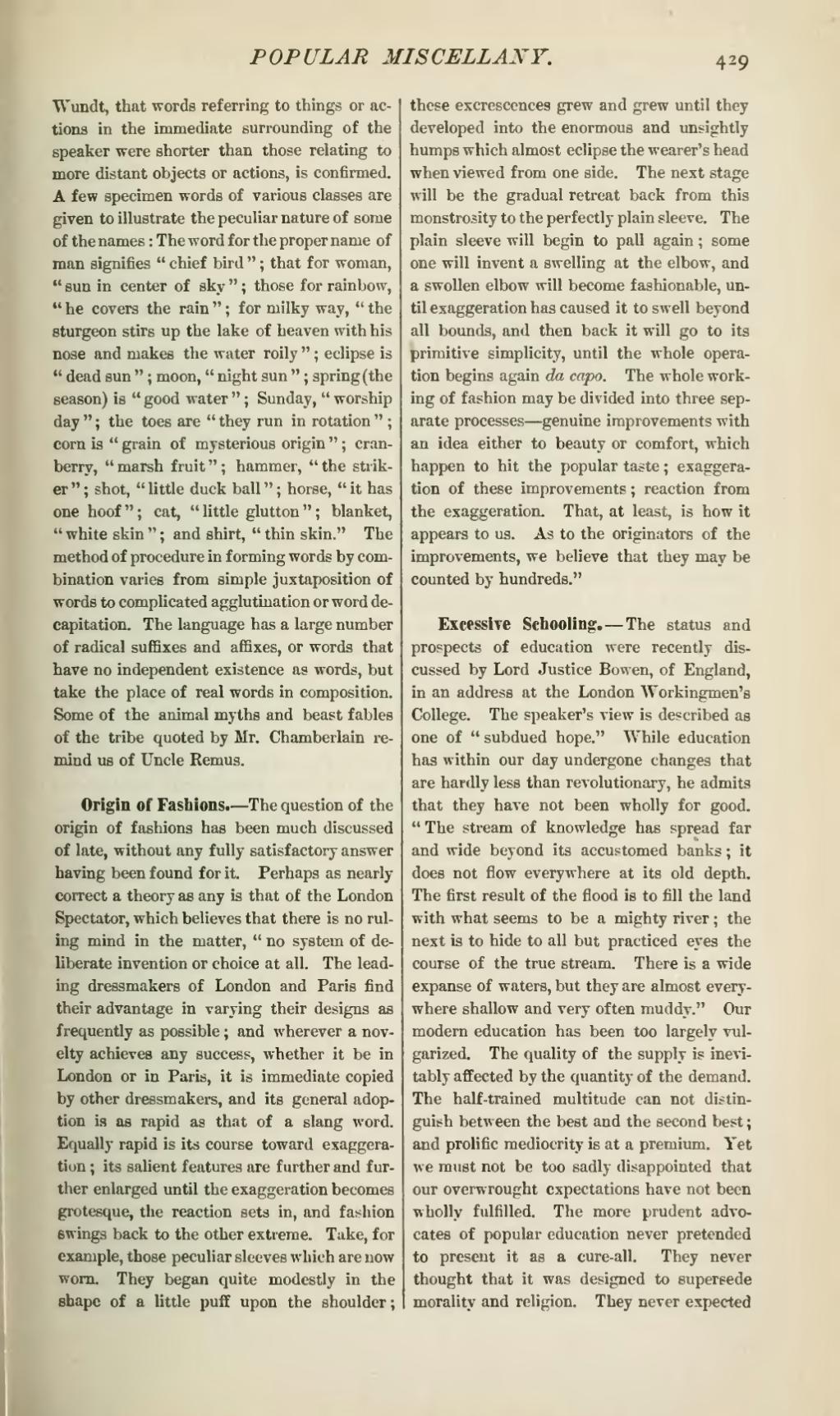Wundt, that words referring to things or actions in the immediate surrounding of the speaker were shorter than those relating to more distant objects or actions, is confirmed. A few specimen words of various classes are given to illustrate the peculiar nature of some of the names: The word for the proper name of man signifies "chief bird"; that for woman, "sun in center of sky"; those for rainbow, "he covers the rain"; for milky way, "the sturgeon stirs up the lake of heaven with his nose and makes the water roily"; eclipse is "dead sun"; moon, "night sun"; spring (the season) is "good water"; Sunday, "worship day"; the toes are "they run in rotation"; corn is "grain of mysterious origin"; cranberry, "marsh fruit"; hammer, "the striker"; shot, "little duck ball"; horse, "it has one hoof"; cat, "little glutton"; blanket, "white skin"; and shirt, "thin skin." The method of procedure in forming words by combination varies from simple juxtaposition of words to complicated agglutination or word decapitation. The language has a large number of radical suffixes and affixes, or words that have no independent existence as words, but take the place of real words in composition. Some of the animal myths and beast fables of the tribe quoted by Mr. Chamberlain remind us of Uncle Remus.
Origin of Fashions.—The question of the origin of fashions has been much discussed of late, without any fully satisfactory answer having been found for it. Perhaps as nearly correct a theory as any is that of the London Spectator, which believes that there is no ruling mind in the matter, "no system of deliberate invention or choice at all. The leading dressmakers of London and Paris find their advantage in varying their designs as frequently as possible; and wherever a novelty achieves any success, whether it be in London or in Paris, it is immediate copied by other dressmakers, and its general adoption is as rapid as that of a slang word. Equally rapid is its course toward exaggeration; its salient features are further and further enlarged until the exaggeration becomes grotesque, the reaction sets in, and fashion swings back to the other extreme. Take, for example, those peculiar sleeves which are now worn. They began quite modestly in the shape of a little puff upon the shoulder; these excrescences grew and grew until they developed into the enormous and unsightly humps which almost eclipse the wearer's head when viewed from one side. The next stage will be the gradual retreat back from this monstrosity to the perfectly plain sleeve. The plain sleeve will begin to pall again; some one will invent a swelling at the elbow, and a swollen elbow will become fashionable, until exaggeration has caused it to swell beyond all bounds, and then back it will go to its primitive simplicity, until the whole operation begins again da capo. The whole working of fashion may be divided into three separate processes—genuine improvements with an idea either to beauty or comfort, which happen to hit the popular taste; exaggeration of these improvements; reaction from the exaggeration. That, at least, is how it appears to us. As to the originators of the improvements, we believe that they may be counted by hundreds."
Excessive Schooling.—The status and prospects of education were recently discussed by Lord Justice Bowen, of England, in an address at the London Workingmen's College. The speaker's view is described as one of "subdued hope." While education has within our day undergone changes that are hardly less than revolutionary, he admits that they have not been wholly for good. "The stream of knowledge has spread far and wide beyond its accustomed banks; it does not flow everywhere at its old depth. The first result of the flood is to fill the land with what seems to be a mighty river; the next is to hide to all but practiced eyes the course of the true stream. There is a wide expanse of waters, but they are almost everywhere shallow and very often muddy." Our modern education has been too largely vulgarized. The quality of the supply is inevitably affected by the quantity of the demand. The half-trained multitude can not distinguish between the best and the second best; and prolific mediocrity is at a premium. Yet we must not be too sadly disappointed that our overwrought expectations have not been wholly fulfilled. The more prudent advocates of popular education never pretended to present it as a cure-all. They never thought that it was designed to supersede morality and religion. They never expected
